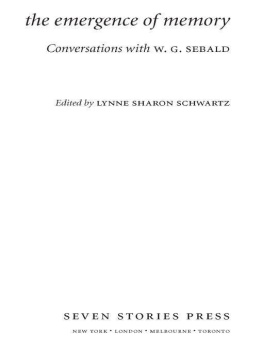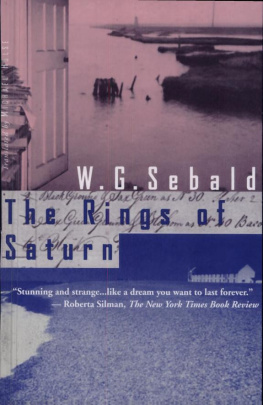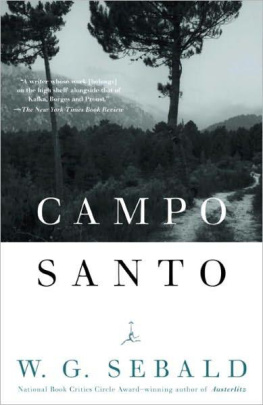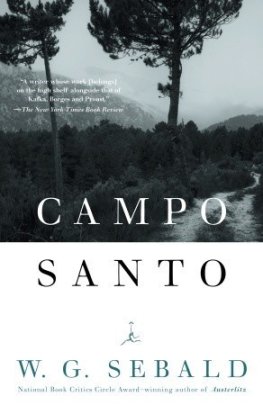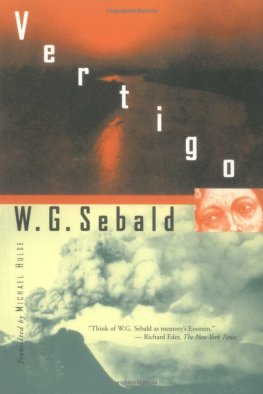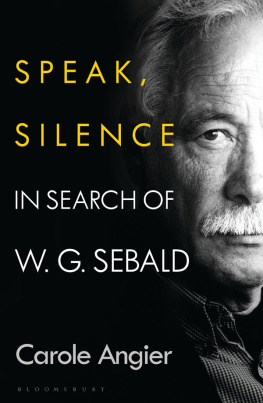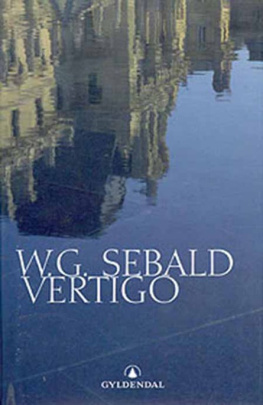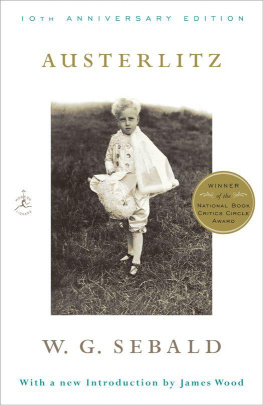Table of Contents
Acknowledgments
I could not have completed this book without the extraordinary assistance of Arleen Zimmerle, reference librarian at Bryn Mawr College, whose proficiency, enthusiasm, esprit, and inexhaustible patience turned the search for materials on W. G. Sebald into an absorbing task. Not least among the discoveries I made over the course of our many Tuesday afternoons in the library was the pleasure of her company.
I was also assisted by the able and amiable Joe Tucker, reference librarian at Bennington College, who gave so promptly and generously of his time and knowledge. And by Elizabeth Catanes, a recent graduate of Bryn Mawr College, who was efficient, helpful, and undaunted by the labyrinths of the Internet.
Introduction
by Lynne Sharon Schwartz
W. G. Sebalds death in 2001 at the age of fifty-seven shocked his readers, certainly; it also left them feeling uncannily bereft. In the few years since The Emigrants , his first work translated from German into English, appeared in 1996, he had become, as if by stealth, an indispensable writer, one we could not afford to lose. More than anyone else writing today, he made it new. His undulating, hypnotic sentences (despite their antique cast) are paradigms of the modern sensibility, its tangled restlessness as well as its torpor. His dreamlike narratives, meandering yet meticulous, echo the lingering state of shock that is our legacynot only from the wars of recent memory but from the century of colonialism that preceded them, indeed, historys long account of calamities.
He made history new as well: the gaze that took in broad swathes of the clearly chronic process of... impoverishment and degeneration also resurrected them with heartbreaking lyrical precision. His language and breadth of vision combined in a slow burn, and by the light of that combustion we could glimpse what we have come from and what we have arrived at. Even, in a few dark, prophetic passages, where were going: For somehow we know by instinct that outsize buildings cast the shadow of their own destruction before them, and are designed from the first with an eye to their later existence as ruins. I found this in his last novel, Austerlitz , which I happened to open in mid-September of 2001a coincidence eerily in keeping with Sebalds own broodings on serendipity across time and space, and on the imponderables that govern our course through life.
The protagonist of Austerlitz , entrusting his life story to the narrator, begins with a curious remark: Since my childhood and youth... I have never known who I really was. Sebald, though he had much in common with Jacques Austerlitz, in one sense knew exactly who he was, to his regret. In Vertigo , on hearing a bunch of rowdy German tourists beneath his Venetian hotel room, the narrator thinks, How I wished during those sleepless hours that I belonged to a different nation, or, better still, to none at all.
He was born in 1944 in the small village of Wertagh im Allgu in southern Bavaria, in the Alps near the Swiss border. He did not know his father, an officer in the Wehrmacht, until the latter returned from a prisoner-of-war camp in 1947. His closest attachment was to his maternal grandfather, a kindly man quite different from the austere, incurious father whom he could never forgive for his participation in the war and his later silence about it. His grandfathers death when Sebald was twelve was a blow from which he said he never recovered.
He studied German language and literature first at the University of Freiburg and then in Switzerland, but dissatisfaction, particularly with his ex-Nazi professors who never alluded to the immediate past, soon compelled him to leave the continent at twenty-one. He continued his studies in Manchester and remained in England; at the time of his death Sebald had been teaching for over thirty years at the University of East Anglia, where he was also the first director of the British Centre for Literary Translation. He was married and left a daughter who survived the auto accident that killed him.
Sebald wrote in his native German. In one of those enigmatic flukes of publishing, the order in which his books appeared in English is not the order in which they were written and published in German. In English, The Emigrants (1996), which won almost universal critical praise for its then unknown author, was followed by The Rings of Saturn in 1998, Vertigo in 1999, and Austerlitz in 2001. The long poem After Nature , which Sebald described as his first venture into nonacademic writing, appeared posthumously in 2002, and On the Natural History of Destruction , based on a 1997 series of lectures he gave in Zurich on the World War II destruction of German cities and the treatment of that subjector, in his view, lack of treatmentby postwar German writers, in 2003. Campo Santo (2005), a collection of essays on his visits to Corsica as well as on various literary figures, was put together after his death.
In German, After Nature was published in 1988; it contains three sections, fictionalized riffs on the lives of Matthias Grnewald, the sixteenth-century German painter; Georg Wilhelm Steller, the eighteenth-century botanist; and Sebald himself. As for the prose works, if they are read in their order of composition, Vertigo , with its flights of invention taking off from the lives of Stendhal, Kafka, and Casanova, shows the tortuous, associative Sebald strategy on a relatively small scale, except for its extraordinary final section on the narrators return visit to his native Bavaria, which gives a sense of postwar village life as it must have been during the authors childhood.
The Emigrants, which was written next , goes far more deeply into Sebalds primary theme of exile and displacement, with each of its four sections devoted to characters who were forced to leave Germany, three because they were Jewish and one for more subtle personal reasons. Three of the four stories end in suicide. Instead of so many losses becoming diminished in effect, each death adds weight to the grief of the next.
In The Rings of Saturn, to my mind Sebalds best work, his imagination is given free rein and his digressive bent carried to its most extremealmost comicreaches. The swirling paths of thought cast a spell: if the reader is willing to submit, the authors sensibility will carry him toward ever more tangled and distressing tales of decay, entropy, and destruction. The novel is shaped by a walking tour through the east of England; the narrators initial search for the skull of Sir Thomas Browne (the seventeenth-century author of Urn Burial ) leads circuitously to a meditation on Joseph Conrad, to Belgian atrocities in the Congo, to the execution of Roger Casement, to Swinburne and Edward FitzGerald, and eventually loops to silkworm cultivation in China and its spread through Europe during the Enlightenment.
The account of the Third Reichs promotion of the silk industry, like so much else in Sebalds work, becomes a metaphor for the unspeakable. Silkworm cultivation, according to the Nazis, will teach the essential measures which are taken by breeders to monitor productivity and selection, including extermination to prevent racial degeneration. He goes on to describe how the cocoons are finally destroyed in rising steam: When a batch is done, it is the next ones turn, and so on until the entire killing business is completed. As Andr Aciman pointed out in a 1998 essay, Sebald never brings up the Holocaust. The reader, meanwhile, thinks of nothing else. (This was written before the publication of Austerlitz ; there Sebald spends many pages on a detailed description of the camp at Terezin.)

